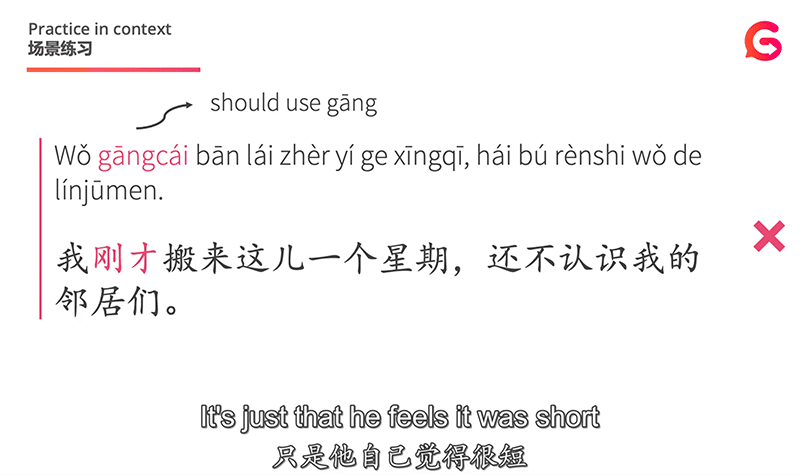Making your Chinese more advanced
Intermediate and advanced learners will struggle with the problem that although you know many Chinese words, the sentences you create (either writing or speaking) are still mostly using HSK1 and HSK2 words: “我喜欢,好喝”, instead of:
- 我喝得很满足 wǒ hē dé hěn mǎnzú (Very satisfied)
- 味道柔和 wèidào róuhé (Gentle taste)
- 我大饱口福了 wǒ dà bǎo kǒufúle (Filled with good taste)
- 这种咖啡闻起来有坚果的香味 zhè zhǒng kāfēi wén qǐlái yǒu jiānguǒ de xiāngwèi (Nutty aroma)
Here are some tips to make your Mandarin more advanced by learning just a few more words (and using them more frequently).
Conjunction words make your Chinese more advanced
Many sentences are dialectic, think about:
- “Let’s do this, despite that”
- “This is true, however….”
- “Yes, but…”
- “And yet….”
We can call these “hinge words”, because you can make a sentence hinge on them, and string sentences and stories together. These are perfect words to sound more advanced, because your sentences start to flow and you clearly emphasize the relationship between things. But if you’re like most learners, you mostly still use 但是 and 可是 — maybe if you’re in a fancy mood add in a 所以 or 不过, and a 如果 when needed.
Here is a list though with replacements in Mandarin to make your speech sound more native and natural:
| English | Alternative 1 | Alternative 2 | Alternative 3 |
|---|---|---|---|
| But | 但是 dànshì | 然而 Rán’ér | 可是 kěshì |
| Because of | 因为 yīnwèi | 由于 Yóuyú | 基于 Jīyú |
| Therefore | 所以 Suǒyǐ | 因此 Yīncǐ | 为此 Wèi cǐ |
| Despite | 虽然 Suīrán | 尽管 Jǐnguǎn | 即使 Jíshǐ |
| Regardless | 不管 bùguǎn | 无论 Wúlùn | |
| Possible | 有可能 Yǒu kěnéng | 有机会 yǒu jīhuì | 也许 yěxǔ |
| If | 如果 Rúguǒ | 若是ruòshì | 要是 yàoshi |
You can use 可是 and 但是, but if you use them all the time (especially in consecutive sentences) your Chinese becomes monotone and dull.
So we can change:
- 我不太喜欢吃比萨,可是我很喜欢这个朋友,所以我跟她一起吃。
To:
- 我很喜欢这个朋友,因此【尽管】我不喜欢吃披萨,【还是】会跟她一起吃。
Use synonyms for simple words
Get in the habit of using synonyms (you probably already know hundreds). A great tool is a Chinese synonym tool.
We can change the sentence to something like:
- 我很喜欢这位女士,因此无论是不是我喜欢的食物,我都愿意与她共同享用
Or:
- 由于我很喜欢这位女士,我愿意与她共同享用披萨,无论我是否喜欢吃
Some common examples:
| Simple Chinese | Alternative |
|---|---|
| 跟他见面 | 聚会/聚餐 |
| 担心 | 为。。。担忧 |
| 越来越少 | 逐渐减少 |
| 是不是 | 是否 |
| 她让 | 她造成了 |
| 这个app太让人上瘾 | 这个app的人工智能程序太让人上瘾 |
Force yourself to describe why or what
我喜欢
不太好
很好
非常好
Are your answers ever like this? It’s hard to overcome because “我喜欢“ is to the point and not that easy to replace. You could say 我对这个东西很满意 but still very much beginner-level Chinese. There’s nothing wrong with that, but our goal here is to make your Chinese more advanced.
“你在做什么?” you can also ask as “你那么神秘” (sometimes this isn’t very polite) or you can say “最近怎么没见到你,在忙什么呢?”
Here are some more advanced word examples:
| Tastes (好喝/吃) | Describing a scenery (好看) | I liked this experience (我很喜欢) | Suitable (好) |
|---|---|---|---|
| 柔和 | 养眼 | 满分 | 合理, 适当的, or 正合我意 |
| 甜酸 | 优美 or 秀丽 | 历历在目 | 符合要求 |
| 脆 | 赏心悦目 | 令人难忘 | 实用 |
| 回味苦涩 | 百看不厌 | 惊险刺激 | 达到预期 |
If someone asks you what you think of a hike you just made, rather than “很好”, you can just say why:
- 嗯,这次出行给我留下了深刻的印象。徒步经常是这样,离开城市才能享受宁静的大自然。
Or we can look at the above sentence:
- 不管我不喜欢吃比萨,我很喜欢这位女士,因此我愿意一起聚餐.
And make it into:
- 聚餐的意义并不在于吃什么,而在于跟谁一起。陪你所爱的人享用美食,同时,与他们愉快地交谈,并随意地谈论彼此的兴趣……这才是有意义的聚餐
Use common sentence structures to make your Chinese more advanced
Forget about grammar, focus on learning sentence structures in Chinese. We actually have listed over fifty of them here.
Taking a course at GoEast
Spoken language is just words spoken in the air (or in a microphone), and therefore harder to “tweak”. What GOEAST teachers do for intermediate and advanced students is write them out, either on a whiteboard or through screen sharing, and then improve the sentence together with the student. In our Spoken Courses and HSK5 & HSK6 courses, we also go over texts and then extract the sentence structures, for you to use in your own words.
In summary
Making your Chinese more advanced — actually using the words you already know — isn’t a quick fix but more a habit you can take up. It’s not something you really do for others, mostly for yourself; because when you hear yourself speak advanced Chinese sentences, you better see your progress and it’ll motivate you to keep learning.
Inside our Advanced Chinese courses
Our Mandarin courses combine self-learning with live classes. Learn Chinese with this efficient method.
Inquire to learn advanced Chinese
What happens when you fill in this form?
- A language consultant will contact you soon
- He or she will form a lesson plan with you, without obligation
- If the times and schedule is agreed with by you, you’ll receive a payment link
- Upon payment, we’ll create an account for you on our learning platform
- Then the learning starts!
Services in English only.
From intermediate to advanced
When you finished HSK4, the gap to HSK5 or even HSK6 feels pretty far away. And it’s true, when you look at how long it takes to learn Chinese, the time required for each new course is increasingly more.
There is an ‘intermediate plateau’ where you feel there’s no visible progress made. The logic behind this is simple; the first 100 hours you put into learning Chinese are super obvious, but the hours you put into learning Mandarin from 5oo to 600 hours, are less big of a change — even though you probably learn more words in those ‘100 hours’ than the first. (It’s easier to learn 100 words when you already know +1000 Chinese words.)
Then there’s another factor. When you’ve already spend over 500 class hours into learning Mandarin and you still feel at an intermediate level, it’s super de-motivvating when you still make mistakes. Yet everyone does, even beginner Chinese mistakes.
Our Advanced Chinese courses aim at getting you to learn new words but also existing words in a new way. To speak, listen, write and read. We can use more written Chinese materials such as HSK5 & 6, or Spoken Chinese such as 会通汉语.
Tips for learning advanced Chinese
When your Chinese is good enough for you — let’s say HSK4 or even HSK5 to HSK6 — to dive into and read Chinese websites, a whole new world will open up to you. You will begin to understand how real Chinese people express themselves about matters that concern their daily lives including western cultures, (Western) politics, and 老外 (Lǎowài: foreigner). You can finally skip the textbook conversations with your Chinese teachers and other foreign classmates, and embrace how Chinese people use their language online — the lingoes, abbreviations of proper nouns, the curse words, etc. If you’re at that level here are a few online Chinese websites for advanced learners to get you started.
Five Chinese community websites for advanced learners
Zhihu: Questions & answers, perfect for advanced Chinese learners

知乎, is like the Chinese Quora. Like Quora, all questions are met with legitimate answers written by people from related fields. Some make jokes with a rather simple but smart answer, and those would sometimes end up trending on Chinese social media. In fact, a lot of foreigners have already become famous on Zhihu.
They often maintain profound knowledge of Chinese culture and society, can make inside jokes in Chinese, and are not afraid of proving their true identities by posting selfies. Their answers would get a lot more attention from other users, since Chinese people have a lot of respect for foreigners who can speak Chinese well, as you may have discovered already. The functionality of the website is almost exactly the same as Quora, but since it’s been designed for Chinese people, you might be able to learn a lot about Chinese culture and improve your Chinese fast.
Here’s one post that gathered many foreign Zhihu users. They are from Korea, Argentina, Malaysia, Poland, UK, US…they not only talked about their own experience with Zhihu, showed their love for the website, but also compared it with Quora:
https://www.zhihu.com/question/19917846
Douban: reviews on movies & books for Chinese students

豆瓣, one great invention of our own! As the slogan goes, “和有趣的人做有趣的事”(do interesting things with interesting people), Douban gathers people that share the same interests in music, books, films, TV shows, hobbies, and many more. You can hide your identity if you choose, and immerse yourself into this incredibly large community. Whether you’re a music lover, a movie nerd, or a book worm, you can write and share reviews, rate the artwork, and collect them to put in a list that you create as you please – e.g. “movies to watch when you’re home alone on a Friday night” or “overrated romantic novels”, for others to browse and share.
Many Chinese people have had very pleasant experience in meeting with people on Douban and actually becoming good friends in real life, mainly for sharing similar tastes … or similar hates! You could use this website, even if your Chinese language fluency is not good enough to write an essay as they do on Zhihu.
Another great thing about Douban is “同城”(Same City). You can find activities in your city since all museums, bars, cafes, night clubs, music festivals, galleries, book stores have their own accounts and will update whenever there’s an event going on. For instance, if you have a favorite jazz bar in Shanghai, try to find them on Douban, you will find schedules for live performances, photos, events, and information about the artists. Of course, you can go to these events to meet Chinese people and further improve your Chinese speaking!
Douban also has many convenient integration features. Douban Radio can play music according to your favorites. Douban Dongxi is like Douban’s version of Pinterest. Douban Xiaozu is for anyone who wants to start their own forum. Douban Guangbo is a bit like Twitter…it seems that this website has too much on its plate, but it’s actually very user-friendly and you have all the freedom to use whichever sections you want or don’t want. Everything of course in Mandarin Chinese.
Goukr: Another website for Chinese language learners

果壳, a combination of 知乎 Zhihu and Douban Group, and another great Chinese website for advanced learners.
Baidu Tieba: Wikipedia/Reddit in Mandarin

百度贴吧, is a part of Baidu. Baidu Tieba is a platform for people who share the same interests, especially for fans of celebrities…but it also has dark corners for people with strange fetishes and other unspeakable hobbies, which are hard to find on the web. Rumor has it that you could hire a “cleaner” under a specific section by using certain networks. Whatever your preferred topic is, you can use this to read and write in Mandarin Chinese. Due to the strict rules of Chinese internet, a Baidu account has to be linked to your cellphone number, which may have a sim card registered under your true identity.
Tianya: Forums in Mandarin Chinese

天涯社区, is one of the earliest Chinese online forums. It was built in 1999, and quickly became a national Chinese online community. It has a vast variety of topics and hundreds of millions of users. Compared with Zhihu or Douban, it’s more welcomed by the people who haven’t acquired much professional knowledge or are simply more interested in topics like celebrity gossip, mother-in-law issues, dramatic stories of real people’s romantic relationships, ghost stories, etc. There are some famous (or infamous) internet incidents that began on Tianya which quickly spread all over the country and left their marks on history. Join in on the chaos while further improving your Chinese, and getting a bit of this type of Chinese culture.
If you want more Chinese online slang language, head to our YouTube channel.
Reviews for GoEast Mandarin
+10.000 satisfied Chinese language students and counting.
















